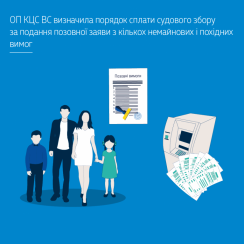Contact center of the Ukrainian Judiciary 044 207-35-46

If a statement of claim combines two or more non-property claims against multiple defendants, the court fee is paid separately for each claim against each defendant.
In the case reviewed by the Joint Chamber of the Civil Cassation Court of the Supreme Court, the bank filed a claim for eviction from a mortgage apartment and removal of four people from the place of registration: two parents and two minor children.
The bank paid court fees for two claims: eviction and deregistration.
The court of appeal ruled that the bank's appeal was not filed, holding that the bank had to pay a court fee for eight non-property claims: for eviction of four people and for deregistration of four people.
Ensuring the uniformity of case law, the Joint Chamber of the Civil Cassation Court of the Supreme Court agreed with the court of appeal and noted that according to part 3, Article 6 of the Law of Ukraine "On Court Fee", if a statement of claim combines two or more non-property claims, the court fee is paid for each non-property claim.
Non-property claims include claims that are not subject to valuation. A non-property claim should be understood as a claim for the protection of a right or interest, the object of which is a benefit that cannot be valued in money.
The key question in determining the number of non-property claims is what the term-concept "claim" means and whether the subjective composition of the legal relations, in particular the number of defendants in the case, should be taken into account in determining it.
Neither the Civil Procedural Code of Ukraine nor the Law of Ukraine "On Court Fees" contain provisions that would allow to conclude that the legislator intends to establish more favorable consequences in the form of payment of court fees in a smaller amount in cases where the plaintiff combines claims against several defendants in one statement of claim.
In the case of a contrary interpretation, there is one eviction claim against four defendants. In this case, if the plaintiff files claims against all defendants at once, the plaintiff will pay a lower court fee than if the claims were filed separately against different co-defendants. At the same time, the national legislation does not provide for any other cases in which the reduction of court fees is linked to the consolidation or severance of claims. The same applies if several plaintiffs file non-property claims against one defendant, in which case each plaintiff pays the court fee separately.
The Joint Chamber of the Civil Cassation Court of the Supreme Court noted that it is advisable to consider the claims against each defendant as independent.
Thus, when interpreting the term-concept "claim" in this case, in addition to the subject matter and cause of action, the subjective composition of the legal relationships (number of co-defendants) should also be taken into account. Thus, even if homogeneous non-property claims are filed, linked by the same grounds and evidence submitted, the court fee should be determined separately for each defendant.
Regarding the claims for deregistration of the defendants the Joint Chamber stated that each of them is an independent claim derived from the claim for eviction of each of the defendants.
Taking into account the above-mentioned, the Joint Chamber is of the opinion that in this case the bank should have paid the court fee for eight non-property claims, and the court of appeal correctly reached this conclusion.
The Resolution of the Supreme Court of September 18, 2023 in case No. 758/5118/21 (proceedings No. 61-5554сво23) - https://reyestr.court.gov.ua/Review/113721711.
This and other legal positions of the Supreme Court can be found in the Database of Legal Positions of the Supreme Court - lpd.court.gov.ua/login.